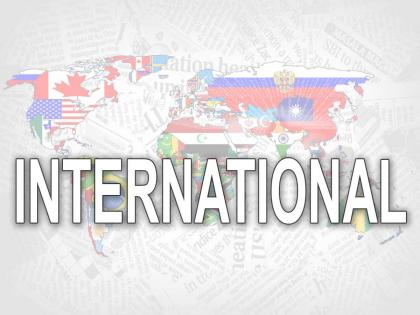Billboards come up around London calling for an end to enforced disappearances in Pakistan
By ANI | Published: June 21, 2019 07:14 PM2019-06-21T19:14:40+5:302019-06-21T20:40:21+5:30
Human rights campaigners from the World Baloch Orgsation and the Baloch Republican Party (BRP) continue with their campaigns to highlight the pathetic human rights condition in Pakistan.

Billboards come up around London calling for an end to enforced disappearances in Pakistan
Human rights campaigners from the World Baloch Orgsation and the Baloch Republican Party (BRP) continue with their campaigns to highlight the pathetic human rights condition in Pakistan.
In their latest initiative, roadside billboards have been put up around the city of London with slogans "Help end enforced disappearances in Pakistan" drawing the world's attention towards the grave issue.
Bhawal Mengal from the World Baloch Orgsation said: "This is a call for help. Our people need help. We need someone to put their foot down and say enough is enough, Baloch, Sindhi, Pashtun, Mohajirs and religious minorities in Pakistan have the right to live without oppression."
"Mothers, sisters, and daughters weep for their loved ones not knowing if they are dead or alive. It is not only the victim that suffers but the entire family, not knowing the whereabouts of their loved ones for years or in most cases forever," added Mengal.
Mengal's uncle Assaudullah Mengal was one of the first victims of enforced disappearances in 1974 at the hands of the state forces, never to be seen again.
The billboards have come up on major motorways and tourist spots around the city including Westminster where the Parliament House is located.
This comes as the UK hosts the quadrennial ICC cricket world cup attracting thousands of cricket fans to the country. The activists hope to grab the attention of Londoners and those who have gathered from all around the world to witness the event.
According to the Commission of Inquiry on Enforced Disappearances, an entity established by the Pakist government, 5,000 cases of enforced disappearances have been registered since 2014.
Most of them are still unresolved. Independent local and international human rights orgzations put the numbers much higher. 20,000 have reportedly been abducted only from Balochistan, out of which more than 2,500 have turned up dead as bullet-riddled dead bodies, bearing signs of extreme torture.
Teenage Ali Haider Baloch, who started protesting for the release of his missing father as a child 10 years ago, himself became a victim of enforced disappearances on Wednesday at the hands of state authorities.
"The cases of enforced disappearances continue unabated as we campaign for an end to this heinous crime against humty," said a spokesman of the BRP, adding "there is hardly any household in Balochistan which has not lost a member as a result of enforced disappearances."
Earlier in January 2014, a mass grave was discovered in Tootak area of Khuzdar. As many as 167 bodies were recovered from the site. Human rights orgsations believed the bodies belonged to previously abducted individuals, who were killed and dumped. However, the recovered bodies were later buried by authorities without any DNA testing.
Pakistan's establishment has been long criticized over its practice of enforced disappearances and extrajudicial killings by International bodies and local human rights orgsations that dare to speak out on the issue.
Before being elected as Prime Minister, Imran Khan had admitted in multiple TV interviews the involvement of Pakistan's intelligence agencies in enforced disappearances and extrajudicial killings and vowed to resign if he was unable to put an end to the practice, holding those involved responsible.
Families of the abducted victims have long been protesting for the safe recovery of their loved ones in the provincial capital Quetta, and their protest camp has now completed more than 3,500 days.
The orgsers of the campaign have long been engaged in efforts to highlight the worsening human rights situation in Balochistan at international platforms, orgsing events around Europe and in the United States, focusing on advocacy activities in the European Parliament, the US parliamentary houses, and the United Nations.
( With inputs from ANI )
Open in app